Stolen Focus: Why You Can’t Pay Attention
£7.99£10.99 (-27%)
THE SUNDAY TIMES AND NEW YORK TIMES BESTSELLER
A SPECTATOR AND FINANCIAL TIMES BEST BOOK OF 2022
A WATERSTONES NON-FICTION BOOK OF THE MONTH
‘If you read just one book about how the modern world is driving us crazy, read this one’ TELEGRAPH
‘This book is exactly what the world needs right now’ OPRAH WINFREY
‘A beautifully researched and argued exploration of the breakdown of humankind’s ability to pay attention’ STEPHEN FRY
‘A really important book . . . Everyone should read it’ PHILIPPA PERRY
—
Is your ability to focus and pay attention in free fall?
You are not alone. The average office worker now focuses on any one task for just three minutes. But it’s not your fault. Your attention didn’t collapse. It has been stolen.
Internationally bestselling author Johann Hari shows twelve deep factors harming our focus. Once we understand them, together, we can take back our minds.
Read more
Additional information
| Publisher | Bloomsbury Publishing, 1st edition (1 Jan. 2023) |
|---|---|
| Language | English |
| Paperback | 352 pages |
| ISBN-10 | 1526620219 |
| ISBN-13 | 978-1526620217 |
| Dimensions | 13 x 2.3 x 19.8 cm |

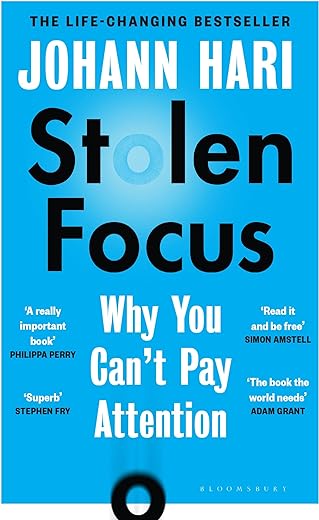

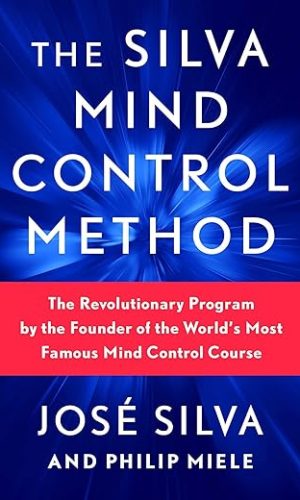
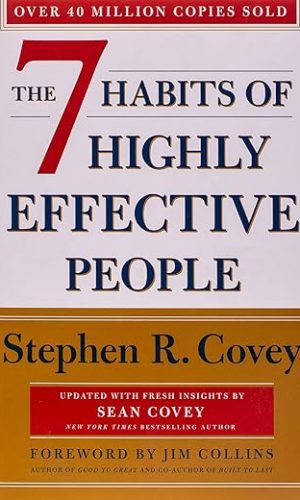

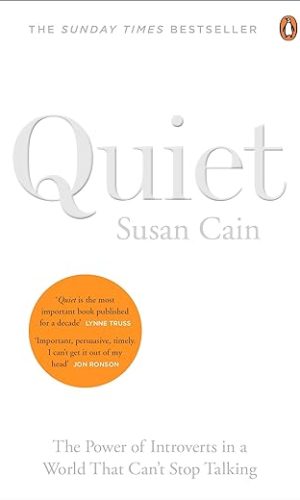
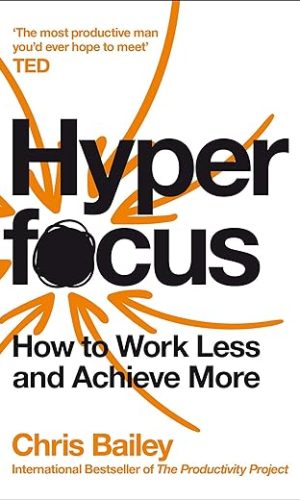
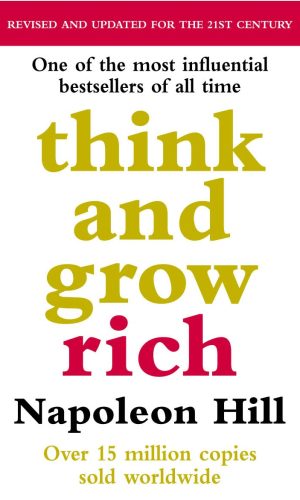
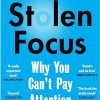
by J. Drew
Stolen Focus: How you are losing attention, Johann Hari looks at how we have reduced attention spans and how all over the world, our ability to pay attention is collapsing. In the US, college students now focus on one task for only 65 seconds, and office workers on average manage only three minutes. And it’s not just the internet – though it’s a big factor. We are no longer able to appear to sustain attention in anything that we do, this goes from a reduction in reading books to an increase in watching TV. In a similar way that 50 years ago, few people were obese and now with ready-made, highly processed junk food everywhere from supermarket meals to fast food joints, obesity and all the health issues that come with it, everyone is at a greater risk of diabetes, heart attacks, strokes and some forms of cancer and many other diseases. And a poor diet reduces our ability to concentrate and learn. However, what else is affecting our attention. The question in this book is that the same thing is happening with our attention.
– INCREASE IN SPEED SWITCHING AND FITERING: The author begins with a holiday and not taking his smart phone. He notices that by not being constantly distracted by Facebook, Twitter, and 1000 TV channels, he begins to read more and notice more. The problem nowadays is we’re constantly switching and trying to filter out information that constantly overwhelms us and distracts us and reduces our ability to focus. We get angry over things we read on Twitter – and rage is an important factor that internet engineers know is very useful in keeping us attached to stay on an internet sites than any happy news.
– A study by Professor Michael Posner at the University of Oregon found that if you are focusing on something and you get interrupted, on average it will take 23 minutes for you to get back to the same state of focus.
– One small study looked at how often an average American college student pays attention to anything, scientists used tracking software on their computers and monitored what they did in a typical day. They discovered that, on average, a student would switch task once every sixty-five seconds. The median amount of time they focused on any one thing was just nineteen seconds. A different study by Gloria Mark, professor of informatics at the University of California, Irvine observed how long on average an adult working in an office stays on one task. It was three minutes.
– The increase in speed, switching and filtering: this is causing us to constantly switch and filter our focus. As we are now presented with more data, people are struggling to focus less on single pieces of information.
– THE DISRUPTION OF MIND WANDERING We need to let our minds wander. By constantly being in a rush and distracting ourselves with tasks, distractions, and entertainment, we never give our minds the ability to just wander. And this is impacting our ability to be imaginative, thoughtful, and reflect on what is going on around us. And as we let our minds wander, we develop greater attention and focus. And by letting our minds wander, we form new connections between ideas and thoughts which can help us to solve problems. Since reading this chapter, I have put my phone down more, and just try to let my mind be freer. I have found this important.
– THE RISE OF PHYSICAL AND MENTAL EXHAUSTION: When you’re tired, the ability to focus or concentrate becomes reduced. Sleep deprivation shows people have reduced cognitive skills and attention becomes reduced – particularly in children. At night, when you sleep, you go through several cycles of sleep – from waking to deep sleep. At a deep level, your brain clears the build-up of plaques as cerebrospinal fluid washes your brain, flushing out toxic proteins and carries these to your liver to be rid of. Lack of sleep is a risk factor for dementia. It also restores your energy levels. More and more people are also knocking themselves out with alcohol or medicinal drugs (e.g., melatonin). 9 million Americans are using prescription sleeping pills.
– COLLAPSE OF SUSTAINED READING: In a study of 26,000 Americans between 2004 and 2017 the proportion of men reading for pleasure had fallen by 40% and in women it was down to 29%. By 2017 the average American spent 17 minutes a day reading books and 5.4 hours on their phone. Some 57% of Americans now do not read a single book in a typical year. In experiments where two groups are given the information in a printed book and the same information on screen, when asked questions about what they had just read, people remembered more information in written form. As we lose our capacity for deep reading that comes from books, we are then becoming less likely to read books. It’s like when you gain weight, it gets harder and harder to exercise when you don’t do it and the same could be true of our ability to read long texts any more with sustained attention.
– Reading helps to develop greater empathy and seeing things from other people’s viewpoints. Experiments show that the more novels you read, the greater your ability to read other people’s emotions. We need to become more empathetic especially as everything is becoming more tribal with ‘us and them’ and ‘black and white’ thinking with understanding and emotional reasoning of complex issues.
– Reading even changes the way we breathe, calmly and slowly as opposed to shallow breathing when following a story on TV or scrolling internet sites. Now we just skim and scan and it prevents us from the joy of reading.
– THE RISE OF TECHNOLOGY THAT CAN TRACK AND MANIPULATE YOU / SURVEILLANCE CAPITALISM AND THE INTERNET: Every time you put your phone down, there are thousands of engineers in Silicon Valley whose only job is to make you pick your phone up again – often using the same understanding that those in the gambling industry use to keep punters coming back to slot machines and throwing their money away. However, having a digital detox is no more the answer than that wearing a gas mask for two days a week outside isn’t the answer to dealing with pollution. It’s not sustainable and it doesn’t address the systemic issues. The designers of the internet have learnt that it is possible to manipulate your attention to a similar degree that a magician would use to trick your attention, treating you as a puppet, pulling strings and making you choose whatever it wants you too. Its aim is to keep you distracted (whoops, entertained) so you can become a product to sell advertising to. People have learnt how to manipulate your attention though natural opioid hits in your brain that can change your personality, your ability to self-think and your behaviour. Cambridge analytic could determine what kind of person you were through around 30 likes on a social media site and know you better than your own partner – and target people with different information based on these profiles. They would then sell this information to advertisers and others without you knowing and play you like a puppet master. If a politician wants to target you with a personalised message – they could. Much of this is manipulation, control, and propaganda. It’s psychological programming. Google wants to send you down a rabbit hole – the longer you are on their sites, the more they can influence you with advertising. Interruptions cause a deterioration in people’s ability to focus and think clearly – but it’s often what internet sites are trying to do to you. One example sited is where social media hits use to make you hit a new page for a new page of searches, but by making people use an infinite scroll, they keep you staying on a site for longer. Google’s wealth is worth $1 trillion – it doesn’t want to change these formulas or algorithms, so will continue to keep you distracted, rob you of attention and your ability to work on alternative tasks that are real and more meaningful. Facebook makes more money for every extra second you are glued to their screen, and they lose money every time you put the screen down.
– Shoshana Zuboff states that information and communication are more widespread that electricity, reaching three billion of the world’s seven billion people. We sometimes blame ourselves for being too unfocused, but willpower alone isn’t going to change your addictions to the internet – because you are fighting a losing battle. But what is it doing to our children? Imagine if a site could show you happy or sad news, the algorithms don’t care how you feel, they just want you to keep scrolling, whilst you miss out on what life’s better alternatives such as meeting friends or having better life experiences. And the more time you look, the more money these sites make. We are becoming lost in lies. If you give people fairy tales or reality – many choose fairy tales and can’t tell the difference. However, things have changed – women have more equality, being gay is no longer a mental disorder (the DSM-II had it as one in 1969) or illegal in many countries (homophobia ruled for 2000 years and then it didn’t and there is greater tolerance of multicultural societies – so change can occur. People might think it too late to change but the axe existed for 1.4 million years before anyone put a handle on it, the web is less than 10,000 days old.
– THE SURGE IN STRESS AND HOW IT TRIGGERS VIOLENCE: The number one reason that people, when surveyed said was the root cause of their difficulties, the number one reason was stress. However, nowadays you are more likely to be given medicines such as Ritalin or antidepressants, rather than looking at the root causes of depression such as increased workloads, lack of appreciation and constant criticism. When a flower is broken, you fix the environment it grows in, not the flower itself – but we’re not fixing the environment our children are growing in. And Ritalin doesn’t treat sexual abuse and significant parental neglect or trauma or poverty. If you’re stressed, you become hyper-vigilant to threats and that is exhausting. Stress often triggers other problems that undermine attention. One study sites how children who have been abused compared to children who hadn’t, showed that those abused had double the rate of ADHD. And once we are stressed, we become hypervigilant to further threats, seeing them everywhere. We live in better times than at any time in history, but we are constantly bombarded with new events depicting an alternative view.
– DIET: We feel our bodies with food to act as fuel to run our bodies but over the last but ‘if you put shampoo you won’t be surprised when the engine conks out’ but all over the western world we are putting we are putting food into our bodies that is so far-removed from what we should be putting into run our bodies. And highly processed food is affecting our ability to focus. Numerous studies are showing that giving children highly processed foods full of sugars, trans fats and lacking essential nutrients and vitamins are affecting children’s abilities to concentrate and learn. Countries that eat more healthy based foods have lower rates of having lower levels of ADHD and dementia.
– POLLUTION: People who live within 15 minutes of a busy road in a busy town are more likely to have a 15% increase in dying than people who don’t. Our bodies were not designed to take in and deal with the amount of pollutants in order to have a healthy, optimised brain. One example included in the book discusses how lead was added to petrol for 40 years with all the companies pushing research into whether lead was safe or not being governed by the automobile industry and petrol companies. However, what lead was doing to the brain and places where there are high levels within it dramatically had an impact on children’s ability to learn and an impact on their cognition and memory ability. Lead was also painted on babies’ cots and babies liked the taste. Our brains are consuming high levels of pollutants that our brains don’t know how to process. MRI studies have shown in Mexico where there are areas where there are children exposed to high levels of pollutants that their brains are shrinking and seeing plaques and tangles as you see in dementia patients. These children perform worse when doing tests also. These chemicals act on the chemical messengers in our brain and some scientists are arguing that we no longer have a normal brain.
– THE RISE OF ADHD AND HOW WE ARE RESPONDING TO IT: Between 2003 and 2011, diagnosis of attention deficit hyperactivity disorder soared in the United States by 43% overall and by 55% amongst girls. It has now reached the point that 13% of adolescents in USA have been given this diagnosis and of them the majority have been given powerful stimulant drugs as a result. In Britain the increase has been extraordinary and between 1998 in 2004 alone, the number of children being given stimulants doubled. The question we need to ask is, if it’s a biological problem requiring drugs that act on these chemical messengers. Vets have been regularly given animal tranquillisers and medication such as Ritalin not because they have some chemical disorder but because these animals are kept in zoos or captivity and not allowed to be free to do the things they need to do such as run and walk. Many of these animals are then given medication if all these animals when they’re in the wild do not suffer the same disorders. The same is true of children who have now had so many changes such as significant pressure to perform in exams and to succeed in education and no play or reduced play.
– THE CONFINEMENT OF CHILDREN BOTH PHYSICALLY AND PSYCHOLOGICALLY: Across the world, for almost our entire history, children have run around freely, without their parents, for thousands of years with only a few exceptions such as working in factories and forced into slavery. However, by 2003, in the US only 10% of children spent any time playing freely outdoors on a regular basis. Children are now overwhelmingly kept behind closed doors and when they do go out to play, they are supervised by grown-ups, or it takes place on screens. In schools in both the USA and Britain, teachers are now forced to spend most of their time preparing and drilling children for tests as redesigned by politicians. Free play and free enquiry, where children learn to form relationships, problem solve, get messy and have fun has dramatically reduced and fallen off a cliff. Nowadays, if a parent was to let their child make their own mistakes, play with peers unsupervised, and have fun without supervision, they would be reported and criticised by other adults. Adults are afraid to let play though children are now three times more likely to be struck by lightning than to be killed by a stranger. Would you imprison your child to prevent them from being hit by lightning? The idea that kids can’t play outside without this being dangerous has never been the case in human history. By playing with your peers, you figure out how to make something happen, understand relationships, be creative, exercise and run around, expose yourself to daylight to prevent vitamin D deficiency. And develop crucial forms of attention. Play builds the foundation of a solid personality. Nowadays, we supervise children, we keep them indoors, we organise activities, we supervise play, and we’ve drained it of most of its value. One study showed that instead of play, children are now overwhelmingly spending it on homework (which has exploded by 145% between 1981 and 1997), screens and shopping with parents. A 2004 study found that you S kids spent 7.5 hours more each week on academics than they had 20 years before. We have effectively put children under house arrest. In turn, there has been a big rise in anxiety amongst children and teens and part of this is because of play deprivation. And when you’re anxious, your attention will suffer. In Finland, they have begun to encourage much more free play, and they have left ADHD and less problems with mental health difficulties in children. In many other parts of the world, children no longer know what to do when playing with their peers. And yet parents often complain that all their children are doing is watching their screens on smartphones or iPads.
– In experiments carried out on two groups of rats, the first were prevented from playing with other apps at all and the second group was allowed to play with rats one hour a day. Scientists watched the rats as they grew up and noted differences. By the time they became adults, the play deprived rats experienced much more fear and anxiety and they were less able to deal with unexpected events. The rats who got to play were braver, more likely to explore and better able to cope with new situations. The rats who had been allowed to play were also significantly smarter and able to problem solve much better than the play deprived rats.
– In Finland, children don’t go to school until their seven years of age and before then they just play. Between 7 and 16, they are given almost no homework and they sit almost no tests until they graduate from high school. Free play is the beating heart of Finnish kids’ lives and by law teachers have to give kids 15 minutes of free play for every 45 minutes they are teaching. And the outcome is that only 0.1% of their kids are diagnosed with attention problems and Finns are the most literate, numerate and happy people in the world.
CONCLUSION: So what can we do? Read this book, stop switching, eat better foods, become aware of the internet’s tricks, let children play and rather than over supervise or imprison our children. Their health will suffer, they will be less fit, less happy, more anxious. Imagine you brought a plant and you wanted to help it grow, what would you do? You would make sure it had sunlight, water, and was filled with the right nutrients. You would protect it from the things that could damage or kill it, planted far from the trampling feet of other people and from pests and disease. If you want to fix a flower, first you fix the environment that it grows in and not the flower itself. We need to liberate ourselves from people who are controlling our minds without our consent. the two great dystopian writers of 20th century, George Orwell and Alexis Huxley wrote about surveillance and Big Brother and that if we entertained the masses, they wouldn’t care what was going on [see China for a good example of this] so by being aware, maybe we can change both ourselves and our children. The liberation of human attention may be the defining moral and political struggle of our time.
by Sean H.
This book has many redeeming qualities. It is highly informative about the aims and ambitions of what most of us are exposed to, not just daily, but practically all of our waking hours. We live on our screens. We tap. We look away, and return to tapping that screen.
This book is very revealing as to why we are hooked to our social media and our ever growing screens (they’re getting huge!). He delves into the origins of the internet, the people behind it, and the disturbing motives and greed of those who have profited (beyond) handsomely for their roles in our lives. I’m not going to say you need to read this, but you will be more informed of why you scroll, why the scroll even exists, and again, the motives of the inventions that engage you, and keep you engaged. Most of all, it attempts to explain the damage that is being done to us and our children. Our IQ, our concentration, and consequently, our learning, are all put at a disadvantage, and the author has the facts and figures to back up his claims.
The author poses difficult questions for us as individuals and as parents. He doesn’t have all the answers unfortunately, but knowledge and awareness can lead to power over what seems to control us, that’s if we use the knowledge and awareness that we gain. A good read, but now how do we get our kids (and ourselves) to reduce media platform exposure to increase focus, without them hating us? I hope his next book can lend a hand with that!
by Joe Bathelt
Johann Hari’s book falls into an emerging category of books that target the common narrative that technology is a universal force for good in our lives. This first emerged in the academic literature and has been popularised in recent years in books like Deep Work by Cal Newport, Attention by Casey Schwartz, and The Distracted Mind by Adam Gazzaley and Larry Rosen. The common theme across those books is that technology is increasingly fragmenting our attention. Predatory algorithms are designed to exploit our basic psychological needs to keep us glued to our screens in an attempt to extract more advertising money. Johann Hari’s book provides a detailed exploration of these ideas, interspersed with his own reflections and experiences. The tone is sometimes a bit too alarmist for my liking, but it may resonate with some readers. The unique aspect of this book is that Johann Hari adds a broader societal perspective. While many other books recommend personal interventions, e.g. putting your phone out of reach to avoid distraction, Hari takes a critical view of this “cruel optimism”. He argues that the business model of big tech companies that make their wealth through advertising undermines any individual effort. Instead, he suggests activism to spark political change that could regulate these companies or bring them under state control. This broader societal perspective added a new dimension to the debate that I had not previously considered. This book is a well-written and well-researched account of the attention economy that I would highly recommend to anyone who has ever wondered why they had just wasted another 2 hours on their phone.
by M Stojanova
Half of this book is about tech overtaking our lives, and the other half are brief touching points about how pollution, schooling, nutrition, stress and environmental issues could be contributing factors to the rise in children’ ADHD and also adult inability to focus.
by Leeanne Lewis
Fascinating read that really gets you thinking about why we can’t focus as adults and how we need to do more for our children to support them.
May of us remember when we functioned without a mobile.
Thank you Johann Harri enlightening & inspiring!
#stolenfocus #letkidsplay
by Evangelos Kalpakis
Very good book.